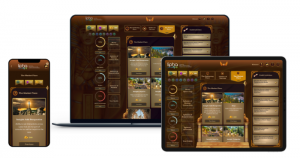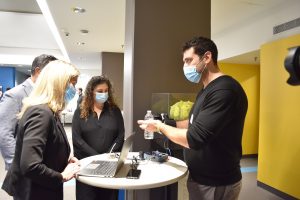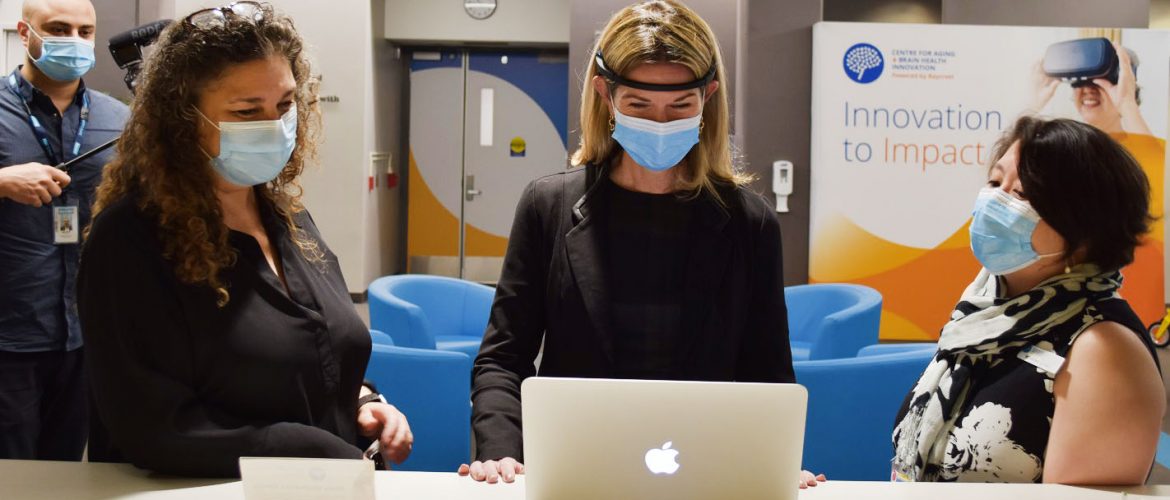CABHI’s innovation showcase featured new and emerging aging and brain health solutions.
The Centre for Aging + Brain Health Innovation (CABHI) opened its doors to welcome Minister Jill Dunlop from the Ontario Ministry of Colleges and Universities (MCU) for a guided tour of CABHI-supported aging and brain health solutions.
The primary focus of the tour was to demonstrate the Learning Inter-Professionally Healthcare Accelerator (LIPHA), a virtual coaching and community platform that provides a simulated learning environment and serious educational game for personal support workers, nurses, and students enrolled in healthcare programs to practice caring for long-term care (LTC) residents.
Thanks to an investment of $1.2M from MCU, the LIPHA program is providing personalized on-demand training for existing healthcare professionals and students considering a career in elder care.
“This innovative app is a flexible and valuable training tool to increase the skills of both current and future health care professionals,” shared Minister Dunlop in last week’s press release announcing the investment. “As Ontario takes action to increase training, recruitment and retention of healthcare workers in the long-term care sector, I encourage all long-term care homes and postsecondary education institutions in Ontario to consider adopting LIPHA and making it a part of their existing training and orientation processes.”
LIPHA is the result of a collaboration between CABHI, the Ontario Centres for Learning, Research, and Innovation in Long-Term Care at Baycrest, and the Kunin-Lunenfeld Centre for Applied Research and Evaluation within Baycrest’s Rotman Research Institute.

The Learning Inter-Professionally Healthcare Accelerator.
Minister Dunlop was also given a preview of CABHI’s Leap platform – a diverse, welcoming, and engaged community, online and in person – that brings older adults, caregivers, and system partners together to inform the advancement of aging and brain health innovations.
The Leap community was an instrumental part in reviewing and refining the LIPHA program to ensure it reflected the needs of LTC residents and those who care for them.
Other stops on the tour included a demonstration of Muse by Interaxon – a brain-sensing headband that uses real-time biofeedback to help older adults, people living with cognitive impairments, and family caregivers practice meditation and mindfulness. Minister Dunlop was given the opportunity to wear the Muse headband and observe her brain’s biofeedback during a presentation by Dr. Rosanne Aleong, Director of Research, Innovation, and Translation at Baycrest.

Steadiwear CEO & co-founder Mark Elias demonstrating his innovation to Min. Dunlop.
Ontario-based startup Steadiwear was also present at the innovation showcase. CEO & co-founder Mark Elias demonstrated how Steadiwear’s responsive glove stabilizes the wrist joint to reduce hand tremors in those living with Essential Tremor and Parkinson’s disease. Steadiwear recently joined CABHI’s Mentorship, Capital, and Continuation (MC2) Capital program, in partnership with National Bank. The MC² Capital program provides early-stage Canadian healthtech companies access to capital, buyers, subject matter experts, and international markets.
Throughout its many displays, including solutions from CABHI-supported startups Cosm Medical and Axem Neurotechnology, the innovation showcase demonstrated the way CABHI bridges the gap between research, innovation, and commercialization to help place aging and brain health solutions into the hands of older adults and caregivers who depend on them. With support from funders like the Ministry of Colleges and Universities, CABHI continues to champion a robust culture of innovation throughout Canada and the world.


